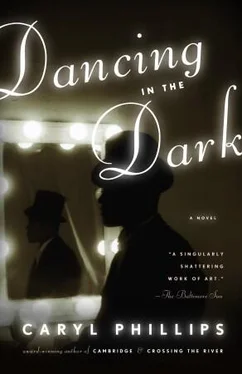Men are already lounging outside of Marshall’s, one foot back up against the wall, pulling on cigarettes and tipping their hats to passing ladies. The slow male rhythm of the day. And then they see George’s girl and step to one side to let her pass, with a volley of “ma’am’s” and “morning’s”, and up the steps she bounces with a thin grimace on her lips but little else to betray the fact that she does not care for these men or their deportment, for not one of them possesses the breeding to avert his eyes when in the presence of a lady. Once Ada reaches the lobby the smirk buckles on the face of Mr. Marshall. He recognizes her and his hands begin to twitch, and she watches as he clasps them together in front of him. She immediately understands and throws him a weak smile, but no words pass between them. The only question is how to maintain her composure in such circumstances, for clearly neither of them is to blame for this unfortunate turn of events. Ada feels the beads of perspiration pooling in her armpits and then dripping helplessly down the inside seams of her special dress. Yes ma’am . Mr. Marshall. Should she call him by his name? Yes ma’am . Mr. Marshall, I’d be most grateful if you could tell Mr. Walker that I stopped by to call on him. Yes ma’am . Mr. Marshall, when George has finished entertaining would you be so good as to remind him that today we have an appointment? Mr. Marshall, please don’t tell him that you saw me. Yes ma’am . Mr. Marshall, please don’t mention my presence here this morning. Mr. Marshall.
It would be an exaggeration to call it a park, but that’s what Lottie called it when she bragged about how her always-attentive Mr. Williams escorted her there to relax. She regaled Ada with stories of how Mr. Williams encouraged her to sit comfortably and then wooed her with tales of his early life, but it would be an exaggeration to call it a park. Two benches set down in a small field of concrete. A queer-shaped quadrant with a single flower bed, but coloreds were permitted to sit in this park in the middle of New York City and contemplate their day, their life, their predicament. Ada sits by herself, her damp dress clinging to her sides, and she stares at the near-horizontal branches of the solitary tree that suggests that the name “park” might not be a misnomer. One thickset tree, two dozen tired branches, one hidden sun, a city, a roar, confusion raging in her head, and hot tears trapped behind her eyes. One stupid photograph for a tobacconist’s advertisement and she throws herself like a cheap bouquet into the hands of a man who carelessly drops her and picks her up and drops her and picks her up again. Of course, it makes sense that every woman should want him, but why can he not learn to say no? Or at least learn to protect her? She would settle for this. Ada has yet to approach George with this idea (Protect me, George) , but she knows that she must find these words. With his spats, and his embroidered vest, and his gold teeth, she understands why every woman wants him.
He dreams vividly, and in full color. The powerful images are always captivating, and frequently they overwhelm him with their intensity, but he is unable to arrest his dreams. He often wakes up in the morning, the sheet and pillow soaked with sweat, his body cold and shivering, having tossed and turned all night in the damp bed. Hot sun, that is what he remembers most about the Bahamas of his birth. Hot sun, tall trees, and the sound of the sea, although he cannot remember actually ever going into the water for that would have meant taking off his clothes and already he was conscious of his size, and he had no desire to draw unwanted attention to himself. And so he would sit and listen to the gentle engine of the sea, and occasionally walk on the beach and let the sand funnel through his toes, and he remembers these moments and dreams of his tall stately father, who walks as though he is balancing the roof of the sky on his head, and his mother, with her light skin and strange green eyes, who suggests many worlds in one face. His parents say little to him, but they radiate a quiet authority that is confirmed by the manner in which others look at them. He understands that the pair of them have little money, but they possess a refined quality that he must never betray by behaving like the rough barefoot children from Irish Town or Wendell’s Reef, with their backsides hanging out of their pants, children who will never leave the island or visit any place in their imagination. He dreams of the warm tropical Caribbean, and a childhood of few cares or concerns; he dreams of a boyhood blessed with books and sun and sand and long hot days that merge one into the other as though the world will for evermore proceed in a seamless pattern of Caribbean indolence. And then he wakes up in a shapeless sodden patch, his sweat having cooled so that any movement sends chills racing through his gracefully curved body. His hot Caribbean past undermined by cold American anxieties, and his tired mind still spinning backward, trying eagerly to reclaim the Bahamian beach that, all those years ago, his parents gave up for Florida.
He once more closes his eyes and urges his mind to hurry back in the direction of the Caribbean, but this time he finds himself shipwrecked in Florida with the shocked faces of his parents staring at each other, and their son looking intently at the horizon trying desperately to repossess what his family has recently left behind. In this new place they are now encouraged to see themselves as inferior and they are to be paid less than others for picking oranges from the tired branches of row after row of squat trees. In this new place called Florida they are not treated as West Indian people who have come to America by steamship and who are keen to work; they are not viewed as migrants who are prepared to remake themselves in the new American world, but who nevertheless hold fast to a dream that one day they might return home with money in their pockets to live out the late autumn and winter of their lives. In this new place they are simply Negroes. In this new place, young Bert looks at his distraught father, who, unable to face the humiliation of an immediate return to the land they have just waved farewell to, promptly gathers up their belongings, and his eleven-year-old son, and steps on board a ship bound for California, on the far side of this already vexing United States of America.
To his young mind, Panama is simply a narrow strip of water along which the ship moves with dull deliberation. The vessel scarcely deviates to the left or to the right as it furrows a lonely passage across the watery breadth of this uninspiring country before entering the blue water of the Pacific. Whenever he dreams of a sea voyage it is this ship that he is on, his father struck dumb by the knowledge of one American failure and fearful of another in the west. It is on this ship that he develops his fear of water, so much so that long before the ship reaches San Pedro, California, he has already decided that unless it is absolutely necessary he will never again set foot on board such a vessel. And then he notices a thick film of grease on the sea that neither the water will swallow nor the sun burn off, and he looks up and sees the busy Californian harbor with its low flat buildings coming into view, and he turns slightly and the dampness of the bed startles him awake, but he knows that the dream is unfinished and so he rolls in the other direction until he once more discovers sleep and the happier images of his father finding work as a citrus grower, and his mother’s relieved face as she takes in people’s laundry in their new town of Riverside, California. These visions quickly banish memories of the ship and the water and Florida, and the Williams family now begins to learn how to be both of the Caribbean and of the United States of America; they begin to learn how to be coloreds and niggers, foreigners and the most despised of homegrown sons. Eleven-year-old Bert begins to learn the role that America has set aside for him to play.
Читать дальше












